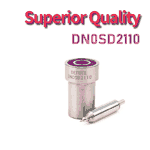Information injection-pump assembly
BOSCH
9 400 614 116
9400614116
ZEXEL
101432-4000
1014324000
ISUZU
8970629690
8970629690
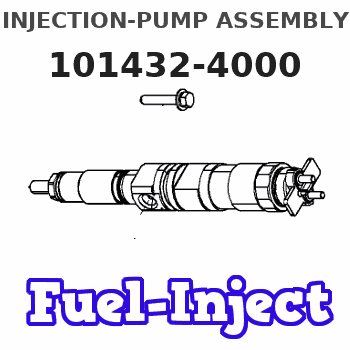
Rating:
Service parts 101432-4000 INJECTION-PUMP ASSEMBLY:
1.
_
5.
AUTOM. ADVANCE MECHANIS
6.
COUPLING PLATE
8.
_
9.
_
11.
Nozzle and Holder
5-15300-016-0
12.
Open Pre:MPa(Kqf/cm2)
11.8{120}
13.
NOZZLE-HOLDER
15.
NOZZLE SET
Include in #1:
101432-4000
as INJECTION-PUMP ASSEMBLY
Include in #2:
104267-5003
as _
Cross reference number
BOSCH
9 400 614 116
9400614116
ZEXEL
101432-4000
1014324000
ISUZU
8970629690
8970629690
Zexel num
Bosch num
Firm num
Name
101432-4000
9 400 614 116
8970629690 ISUZU
INJECTION-PUMP ASSEMBLY
C240 * K 14BC PE4A,5A, PE
C240 * K 14BC PE4A,5A, PE
Calibration Data:
Adjustment conditions
Test oil
1404 Test oil ISO4113 or {SAEJ967d}
1404 Test oil ISO4113 or {SAEJ967d}
Test oil temperature
degC
40
40
45
Nozzle and nozzle holder
105780-8140
Bosch type code
EF8511/9A
Nozzle
105780-0000
Bosch type code
DN12SD12T
Nozzle holder
105780-2080
Bosch type code
EF8511/9
Opening pressure
MPa
17.2
Opening pressure
kgf/cm2
175
Injection pipe
Outer diameter - inner diameter - length (mm) mm 6-2-600
Outer diameter - inner diameter - length (mm) mm 6-2-600
Tester oil delivery pressure
kPa
157
157
157
Tester oil delivery pressure
kgf/cm2
1.6
1.6
1.6
Direction of rotation (viewed from drive side)
Left L
Left L
Injection timing adjustment
Direction of rotation (viewed from drive side)
Left L
Left L
Injection order
1-3-4-2
Pre-stroke
mm
2.25
2.2
2.3
Beginning of injection position
Drive side NO.1
Drive side NO.1
Difference between angles 1
Cal 1-3 deg. 90 89.5 90.5
Cal 1-3 deg. 90 89.5 90.5
Difference between angles 2
Cal 1-4 deg. 180 179.5 180.5
Cal 1-4 deg. 180 179.5 180.5
Difference between angles 3
Cyl.1-2 deg. 270 269.5 270.5
Cyl.1-2 deg. 270 269.5 270.5
Injection quantity adjustment
Adjusting point
-
Rack position
12.7
Pump speed
r/min
1000
1000
1000
Average injection quantity
mm3/st.
38.8
37.8
39.8
Max. variation between cylinders
%
0
-2
2
Basic
*
Fixing the rack
*
Injection quantity adjustment_02
Adjusting point
-
Rack position
8.2+-0.5
Pump speed
r/min
350
350
350
Average injection quantity
mm3/st.
7
5.9
8.1
Max. variation between cylinders
%
0
-14
14
Fixing the rack
*
Test data Ex:
Governor adjustment
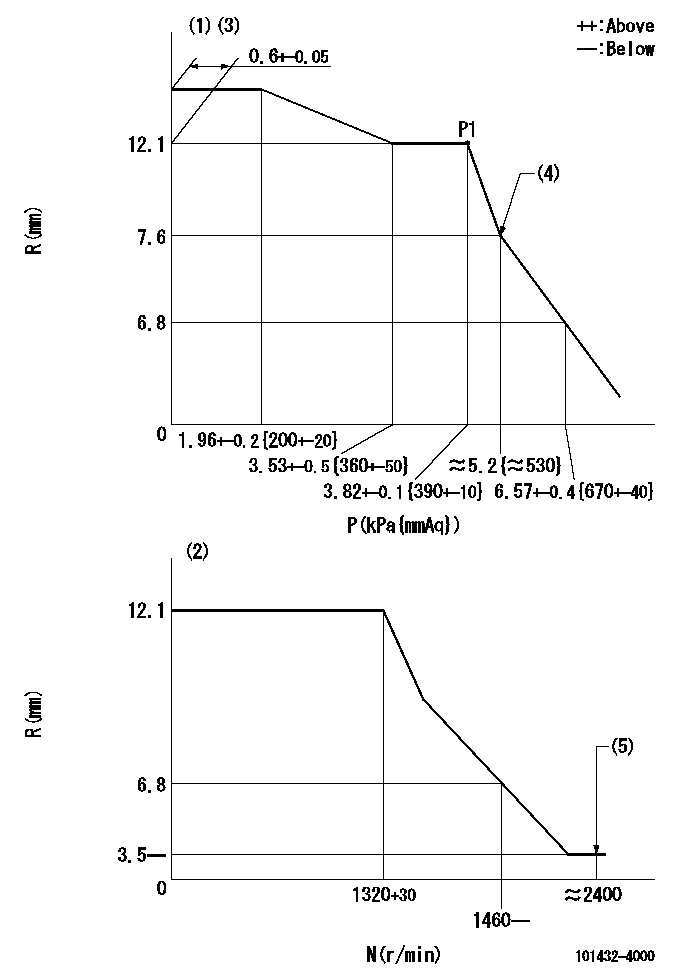
N:Pump speed
R:Rack position (mm)
P:Negative pressure
(1)Pneumatic governor
(2)Mechanical governor
(3)Acting negative pressure: P1
(4)Beginning of idle sub spring operation: L1
(5)Injection quantity Q = Q1 or less
----------
L1=7.6+-0.3mm Q1=3mm3/st
----------
----------
L1=7.6+-0.3mm Q1=3mm3/st
----------
0000001101
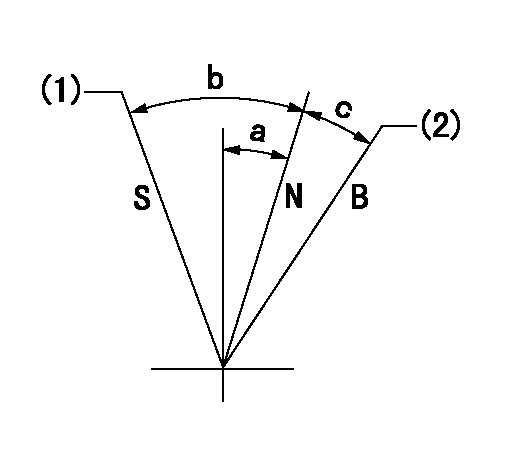
S:Stop
N:Normal
B:When boosted
(1)Rack position = aa
(2)Rack position bb
----------
aa=0mm bb=18mm
----------
a=1deg+-5deg b=26.5deg+-5deg c=9deg+-5deg
----------
aa=0mm bb=18mm
----------
a=1deg+-5deg b=26.5deg+-5deg c=9deg+-5deg
Timing setting
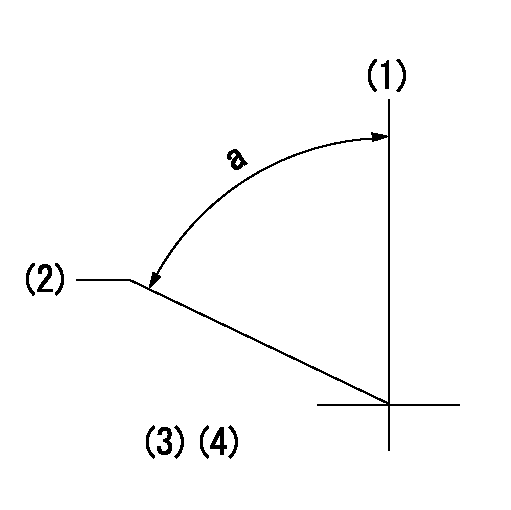
(1)Pump vertical direction
(2)Gear mark Z for the No. 4 cylinder's beginning of injection
(3)B.T.D.C.: aa
(4)-
----------
aa=18deg
----------
a=(60deg)
----------
aa=18deg
----------
a=(60deg)
Information:
Grounding Practices
Proper grounding for vehicle and engine electrical systems is necessary for proper vehicle performance and reliability. Improper grounding will result in uncontrolled and unreliable electrical circuit paths.Uncontrolled engine electrical circuit paths can result in damage to main bearings, crankshaft journal surfaces, and aluminum components.Uncontrolled electrical circuit paths can cause electrical noise which may degrade vehicle and radio performance.To insure proper functioning of the vehicle and engine electrical systems, an engine-to-frame ground strap with a direct path to the battery must be used. This may be provided by way of a starter motor ground, a frame to starter motor ground, or a direct frame to engine ground.In any case, an engine-to-frame ground strap must be run from the cylinder head grounding stud to the frame and negative battery post.
Cylinder Head-To-Battery (-) Ground
Alternate Cylinder Head-To-Battery (-) GroundThe cylinder head must have a wire ground to battery as shown in the above illustrations.Ground wires/straps should be combined at ground studs dedicated for ground use only. At "Every 12,500 miles (20 125 km) or 250 hours," Inspect/Check all engine grounds. All grounds should be tight and free of corrosion.All ground paths must be capable of carrying any conceivable fault currents, and an awg # 0 or larger wire is recommended for the cylinder head grounding strap.The engine alternator should be battery (-) grounded with a wire size adequate to handle full alternator charging current.
When boost starting an engine, follow the instructions in "Engine Starting" in the "Operation Section" to properly start the engine.This engine may be equipped with a 12 or 24 volt starting system. Use only equal voltage for boost starting. The use of a welder or higher voltage will damage the electrical system.
The engine has several input components which are electronic. These components require an operating voltage.Unlike many electronic systems of the past, this engine is tolerant to common external sources of electrical noise, but electro-mechanical buzzers can cause disruptions in the power supply. If electro-mechanical buzzers are used anywhere on the vehicle, it is desirable to have the engine electronics (control group, throttle position sensor, and "check engine" lamp) powered directly from the battery system through a dedicated relay, and not through a common power bus with other key switch activated devices.Engine Electrical System
The electrical system can have three separate circuits: the charging circuit, the starting circuit and the low amperage circuit. Some of the electrical system components are used in more than one circuit. The battery (batteries), circuit breaker, ammeter, cables and wires from the battery are all common in each of the circuits.The charging circuit is in operation when the engine is running. An alternator makes electricity for the charging circuit. A voltage regulator in the circuit controls the electrical output to keep the battery at full charge.The starting circuit is in operation only when the start switch is activated.The low amperage circuit and the charging circuit are both connected through the ammeter. The starting circuit is not connected through the ammeter.Charging System Components
Alternator
The alternator is
Proper grounding for vehicle and engine electrical systems is necessary for proper vehicle performance and reliability. Improper grounding will result in uncontrolled and unreliable electrical circuit paths.Uncontrolled engine electrical circuit paths can result in damage to main bearings, crankshaft journal surfaces, and aluminum components.Uncontrolled electrical circuit paths can cause electrical noise which may degrade vehicle and radio performance.To insure proper functioning of the vehicle and engine electrical systems, an engine-to-frame ground strap with a direct path to the battery must be used. This may be provided by way of a starter motor ground, a frame to starter motor ground, or a direct frame to engine ground.In any case, an engine-to-frame ground strap must be run from the cylinder head grounding stud to the frame and negative battery post.
Cylinder Head-To-Battery (-) Ground
Alternate Cylinder Head-To-Battery (-) GroundThe cylinder head must have a wire ground to battery as shown in the above illustrations.Ground wires/straps should be combined at ground studs dedicated for ground use only. At "Every 12,500 miles (20 125 km) or 250 hours," Inspect/Check all engine grounds. All grounds should be tight and free of corrosion.All ground paths must be capable of carrying any conceivable fault currents, and an awg # 0 or larger wire is recommended for the cylinder head grounding strap.The engine alternator should be battery (-) grounded with a wire size adequate to handle full alternator charging current.
When boost starting an engine, follow the instructions in "Engine Starting" in the "Operation Section" to properly start the engine.This engine may be equipped with a 12 or 24 volt starting system. Use only equal voltage for boost starting. The use of a welder or higher voltage will damage the electrical system.
The engine has several input components which are electronic. These components require an operating voltage.Unlike many electronic systems of the past, this engine is tolerant to common external sources of electrical noise, but electro-mechanical buzzers can cause disruptions in the power supply. If electro-mechanical buzzers are used anywhere on the vehicle, it is desirable to have the engine electronics (control group, throttle position sensor, and "check engine" lamp) powered directly from the battery system through a dedicated relay, and not through a common power bus with other key switch activated devices.Engine Electrical System
The electrical system can have three separate circuits: the charging circuit, the starting circuit and the low amperage circuit. Some of the electrical system components are used in more than one circuit. The battery (batteries), circuit breaker, ammeter, cables and wires from the battery are all common in each of the circuits.The charging circuit is in operation when the engine is running. An alternator makes electricity for the charging circuit. A voltage regulator in the circuit controls the electrical output to keep the battery at full charge.The starting circuit is in operation only when the start switch is activated.The low amperage circuit and the charging circuit are both connected through the ammeter. The starting circuit is not connected through the ammeter.Charging System Components
Alternator
The alternator is
Have questions with 101432-4000?
Group cross 101432-4000 ZEXEL
Isuzu
101432-4000
9 400 614 116
8970629690
INJECTION-PUMP ASSEMBLY
C240
C240
